Yes, cryptocurrency trading is legal in India, but it is tightly regulated. Cryptocurrencies are classified as Virtual Digital Assets (VDAs) under the Income Tax Act. They are not legal tender like the Indian Rupee (INR), but they can be legally traded and held as assets.
Traders must comply with a strict tax and reporting regime, which includes:
30% flat tax on all gains (no offset for losses)
1% TDS on transactions over ₹50,000
18% GST on platform fees (as of July 2025)
Mandatory disclosures via Schedule VDA in ITR-2 or ITR-3
Failure to comply may result in penalties, notices, or invalidation of tax filings.
Is Crypto Trading Legal in India? Truth Revealed

As mentioned above, India does not accept cryptocurrencies as legal tender, yet trading and investing in them are permitted. This was evident following the Supreme Court's 2020 decision that removed the RBI's previous banking prohibition. Since then, individuals can buy, sell, and even mine cryptocurrencies without needing a license.
Currently, India does not have a dedicated self-regulatory organisation (SRO) for crypto. However, all registered exchanges must comply with KYC and AML standards and register with the FIU-IND (Financial Intelligence Unit of India). (Finlaw)
What Are the Things Traders Must Know About Crypto Trading in India?

1. Legal Landscape & Regulatory Authorities
For 2025, crypto assets are legally recognised as Virtual Digital Assets (VDAs) under Section 2(47A) of the Income Tax Act. This enables trading and investment, although not as fiat currency.
Registered platforms, whether local or international, permit crypto trading as long as they comply with AML and KYC laws.
Regulatory Bodies Involved
CBDT (Central Board of Direct Taxes): Oversees crypto taxation policy.
Income Tax Department: Enforces compliance and audits.
FIU-IND: Ensures anti-money-laundering (AML) oversight.
RBI: Evaluate systemic risk.
2. Taxation Rules for Crypto (VDAs)
| Rule |
Rate / Requirement |
Notes |
| Income Tax on Gains |
30% flat |
No loss set-off allowed |
| TDS on Transactions |
1% above ₹50,000 |
Deducted by exchange |
| GST on Fees |
18% |
Applies to exchange/platform services |
| ITR Reporting |
Schedule VDA |
Mandatory disclosure of all crypto holdings & trades |
Income Tax
Flat 30% on gains from VDAs (crypto, NFTs, etc.)
Only the cost of acquisition is deductible; no other expenses, like fees or mining costs, can be offset.
You cannot carry forward or set off losses, even between different VDAs. (Cointelegraph)
TDS on Crypto Transactions
1% TDS applies on transactions above ₹50,000—buyers deduct this at source.
Crypto exchanges automatically handle TDS compliance, but traders must ensure it is reflected in Form 26AS and ITR.
GST on Platform Fees
From July 2025, crypto platforms will be levied 18% GST on fees (trading, deposits, withdrawals, staking, etc.). Exchanges act as "online service providers."
ITR Reporting (Schedule VDA)
Starting FY 2025–26, taxpayers must declare crypto earnings and transactions in Schedule VDA.
You must report on time and completely, or the system may treat your filings as defective.
International Reporting (OECD CARF)
India will adopt the OECD's Crypto-Asset Reporting Framework (CARF) by 2027, requiring exchanges worldwide to report transactions of Indian users.
3. Usage Limits & Practical Restrictions
Payment Restrictions
Additionally, authorities do not recognise crypto as legal tender for business transactions. Businesses can choose not to accept crypto for payments.
While theoretically permitted in contracts, practical and regulatory obstacles persist.
Institutional Usage & Collateral
Banks usually do not recognise VDAs as collateral. Tokenised securities and stablecoins still lack regulation, and India has yet to establish a clear framework.
Why Has Crypto Trading Grown in India?

Despite a strict tax structure, retail interest in crypto is booming, especially in smaller cities. According to Chainalysis (2024), India ranks among the top 3 globally in grassroots crypto adoption.
In Q4 2024, trade volumes increased twofold as young Indians looked for alternative sources of income due to slow job growth. The crypto market is projected to hit $15 billion by 2035, growing at ~18–19% CAGR.
Crypto exchanges have intensified their activities and lobbying efforts due to a more lenient regulatory landscape, particularly with increased interaction with lawmakers.
Risks & Compliance Challenges for Crypto Traders in India
1) Banking Access Risks
While crypto trading is legal, some banks hesitate to support related transactions, citing a lack of clarification.
2) Regulatory Volatility
India's stance on crypto has shifted multiple times in the past decade, creating uncertainty for investors.
3) Tax Enforcement
CBDT has already issued more than 44,000 compliance notices for unreported crypto trades.
4) Global Reporting (CARF)
By 2027, India is planning to adopt the OECD's Crypto-Asset Reporting Framework (CARF), mandating foreign exchanges to report transactions involving Indian users.
What Are the Best Practices for Crypto Traders in India?
1) Use FIU-registered domestic exchanges.
2) Maintain detailed transaction records with dates, values, and wallets.
3) Verify 1% TDS deduction in Form 26AS.
4) File ITR using the appropriate form:
5) Disclose crypto holdings under Schedule VDA, Schedule FA (foreign assets), and Schedule FSI (foreign income).
6) Stay alert as CBDT has sent 44,000+ notices for crypto noncompliance.
Frequently Asked Questions
1. Is Crypto Trading Legal in India?
Yes. Cryptocurrencies are treated as Virtual Digital Assets (VDAs). Trading, holding, and investing are legal, but crypto is not legal tender.
2. Can I Use Crypto for Payments or as Loan Collateral in India?
No. Crypto is not legal tender, and banks generally do not accept VDAs as collateral. Tokenised securities and stablecoin use cases remain legally unclear and are not yet part of a settled regulatory framework.
3. What Reporting and Compliance Rules Should Indian Crypto Traders Follow?
Traders must report VDA transactions in tax returns (new Schedule/VDA reporting) and ensure platforms deduct 1% TDS where applicable. Thus, keep detailed records of cost basis, timestamps and transfers for tax filing and audits.
4. Are India's Crypto Rules or Taxes Changing Soon?
Possibly. Policymakers are reviewing the 30% tax and 1% TDS rules after industry pushback. They may tighten oversight, but they could ease compliance burdens.
Conclusion
In conclusion, Crypto trading in India is legal but heavily regulated. The government treats cryptocurrencies as assets (VDAs), not as legal tender. Taxes, TDS, and mandatory reporting make compliance crucial for traders.
At the same time, India is among the world's largest crypto markets, with millions of active users and growing adoption.
The next few years will be pivotal as India balances innovation and regulation. Until clearer frameworks emerge, cryptocurrency remains a legal but tightly scrutinised investment avenue, not a mainstream payment system.
Disclaimer: This material is for general information purposes only and is not intended as (and should not be considered to be) financial, investment or other advice on which reliance should be placed. No opinion given in the material constitutes a recommendation by EBC or the author that any particular investment, security, transaction or investment strategy is suitable for any specific person.





























